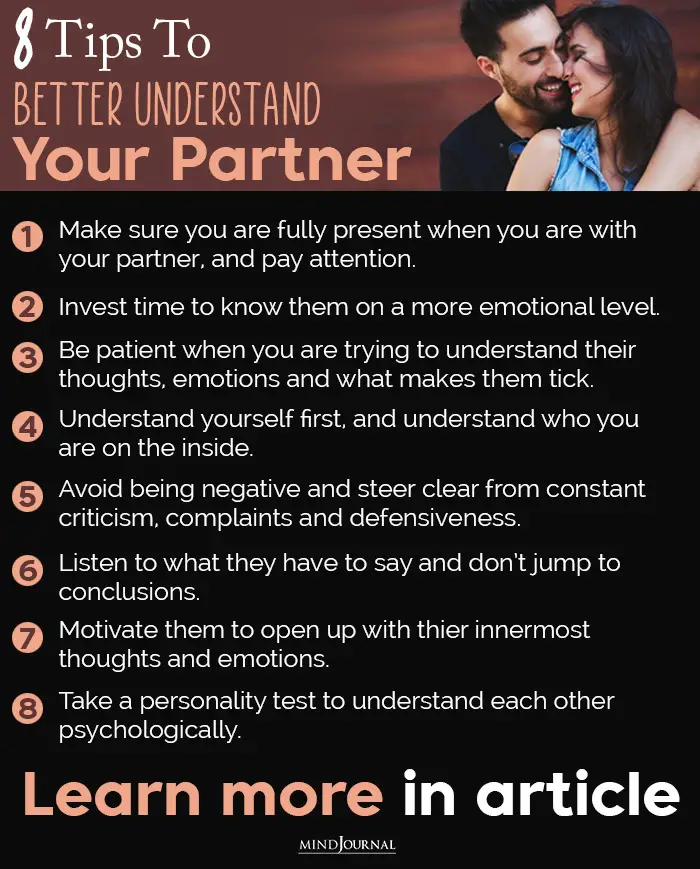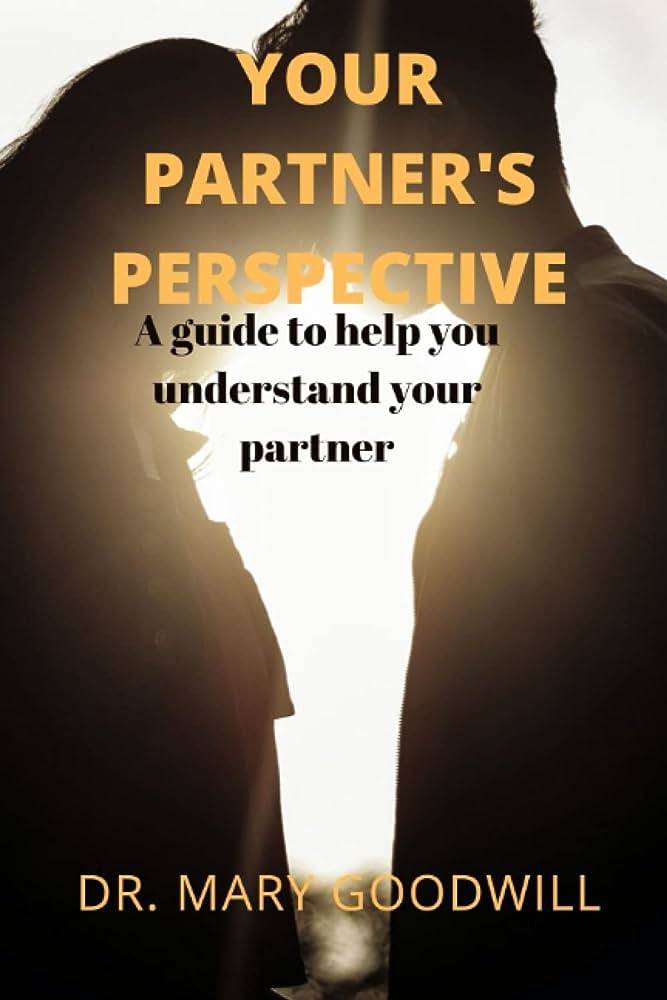
Imagine being able to truly understand your partner’s perspective in every situation. The daily misunderstandings and miscommunications could be a thing of the past. With “How Can I Understand My Partner’s Perspective Better?”, you’ll gain invaluable insights and practical tips on how to bridge the gap in understanding between you and your partner. Say goodbye to frustration and hello to a deeper and more fulfilling connection with your loved one.

This image is property of themindsjournal.com.
Empathy as a Key to Understanding
Understanding your partner’s perspective is an essential aspect of a healthy and fulfilling relationship. Empathy is the key to bridging the gap between your own experiences and emotions and those of your partner. By putting yourself in their shoes and actively listening, you can validate their thoughts and feelings, leading to a deeper connection and mutual understanding.
Putting Yourself in Their Shoes
Putting yourself in your partner’s shoes requires you to imagine what it would be like to experience life from their perspective. It involves stepping outside of your own biases, assumptions, and preconceived notions, and truly trying to see the world through their eyes. This exercise allows you to break down communication barriers and develop a greater empathy for your partner’s emotions and experiences.
Active Listening
Active listening is a fundamental skill that can greatly enhance your understanding of your partner’s perspective. It involves fully engaging in the conversation and focusing on what your partner is saying without judgment or interruption. Active listening requires you to listen not just to the words being spoken but also to the tone of voice, body language, and underlying emotions. By giving your partner your undivided attention, you can foster a deeper sense of empathy and connection.
Validation and Acceptance
Validation and acceptance are crucial components of understanding your partner’s perspective. Validation involves acknowledging and accepting your partner’s emotions and experiences as valid and important, even if you may not fully understand or agree with them. It is about communicating to your partner that you hear them, you understand their feelings, and you respect their point of view. This validation helps build trust, intimacy, and a sense of safety in your relationship.
Improving Communication
Effective communication is essential for understanding your partner’s perspective and fostering a healthy relationship. By engaging in open and honest dialogue, utilizing non-verbal communication, and avoiding defensiveness, you can create an environment where both you and your partner feel heard and understood.
Open and Honest Dialogue
Open and honest dialogue involves expressing your thoughts, feelings, and concerns in a transparent and authentic manner. It is important to create a safe space in which both you and your partner can freely share without fear of judgment or criticism. By fostering open communication, you can gain insight into each other’s perspectives and work together to find common ground and resolve conflicts.
Non-Verbal Communication
Non-verbal communication plays a significant role in understanding your partner’s perspective. It includes facial expressions, body language, gestures, and tone of voice. Paying attention to these cues can offer valuable insights into your partner’s emotions and help you better understand their perspective. For example, a furrowed brow or crossed arms may indicate frustration or defensiveness, while a smile and open posture may indicate happiness and openness.
Avoiding Defensiveness
Defensiveness can hinder communication and prevent you from truly understanding your partner’s perspective. When faced with criticism or differing opinions, it is natural to become defensive and protect your own ego. However, defensiveness not only shuts down the opportunity for understanding but also escalates conflicts. Instead, try to approach disagreements with an open mind and a willingness to listen and understand. By reframing your mindset and focusing on empathy rather than defensiveness, you can create an environment that fosters understanding and growth.
Recognizing Differences and Similarities
Each person brings their own unique set of cultural, background, and personality influences to a relationship. Recognizing these differences and similarities is essential for understanding your partner’s perspective. By appreciating the diverse backgrounds and characteristics that shape each of you, you can develop a deeper understanding of each other’s values and perspectives.
Cultural and Background Influences
Cultural and background influences encompass a wide range of factors, such as ethnicity, religion, family upbringing, and societal norms. These influences shape our beliefs, values, and behaviors, and understanding them can help you grasp the lens through which your partner sees the world. By engaging in conversations about your respective cultures and backgrounds, you can gain insight into the unique perspectives each of you brings to the relationship.
Personality and Temperament
Every person has their own distinct personality and temperament, which play a significant role in shaping their perspective. Some individuals may be naturally more introverted and prefer reflection and solitude, while others may be extroverted and thrive in social settings. Understanding your partner’s personality and temperament can help you appreciate their unique perspectives and adjust your communication style accordingly, creating a more harmonious and understanding relationship.
Identifying Shared Values
While differences are inevitable, identifying shared values is essential for fostering understanding and connection. Shared values act as a foundation of common ground and provide a platform for mutual empathy and understanding. By identifying and discussing your shared values, you can develop a deeper understanding of what is important to both of you and use it as a guide for navigating conflicts and making decisions as a couple.
Exploring Past Experiences and Trauma
Our past experiences, including past traumas, greatly influence how we perceive and respond to the world around us. Understanding your partner’s history and recognizing any past traumas they may have experienced is crucial for understanding their perspective and providing the necessary support for healing and growth.
Understanding their History
Understanding your partner’s history involves actively seeking knowledge about their past experiences, upbringing, and significant life events. It involves asking open-ended questions and providing a non-judgmental and supportive space for them to share their stories. By gaining insight into their history, you can better comprehend the reasons behind their beliefs, behaviors, and perspectives.
Recognizing Past Traumas
Traumatic experiences can have a profound impact on a person’s perspective and emotional well-being. Recognizing any past traumas your partner has experienced is crucial for understanding the lens through which they view the world. Traumas can range from childhood abuse to significant loss or even workplace harassment. By acknowledging and validating your partner’s past traumas, you can create a safe environment for healing and growth.
Support and Healing
Supporting your partner in their healing journey is an essential component of understanding their perspective. It involves providing a compassionate ear, empathy, and validation as they navigate their emotions and memories. Encouraging them to seek professional support, such as therapy or counseling, can also be immensely beneficial. By offering your unwavering support and actively engaging in their healing process, you can deepen your understanding and strengthen your relationship.

This image is property of cdn.projecthotmess.com.
Managing Bias and Assumptions
We all have biases and make assumptions based on our own experiences and beliefs. However, managing these biases and avoiding stereotypes is crucial for understanding your partner’s perspective with an open mind. By questioning preconceived notions, avoiding stereotypes, and nurturing an open-minded approach, you can foster empathy and a deeper understanding of your partner’s unique experiences.
Questioning Preconceived Notions
Questioning your preconceived notions and beliefs is the first step towards broadening your perspective and understanding your partner better. It involves challenging any assumptions or biases that may cloud your judgment and hinder your ability to empathize with your partner. By constantly questioning and reevaluating your beliefs, you can create space for growth and deeper understanding.
Avoiding Stereotypes
Stereotypes often limit our understanding and lead to assumptions about others. Avoiding stereotypes involves recognizing and challenging any preconceived notions you may have about different cultures, backgrounds, or personalities. By actively seeking to understand the unique nuances of your partner’s experiences, you can move beyond stereotypes and embrace their individuality.
Being Open-Minded
Being open-minded is a vital quality when it comes to understanding your partner’s perspective. It requires a willingness to consider alternative viewpoints and approaches, even if they differ significantly from your own. By practicing open-mindedness, you create a safe and inclusive space for your partner to express their thoughts and feelings without fear of judgment or dismissal.
Seeking Professional Support
Sometimes, despite your best efforts, understanding your partner’s perspective may prove challenging. In such cases, seeking professional support can provide invaluable guidance and assistance. Couples therapy, relationship coaching, and family and relationship counseling are all effective avenues to help you navigate the complexities of understanding and empathizing with your partner.
Couples Therapy
Couples therapy offers a safe and structured environment for both partners to explore and understand each other’s perspectives. A trained therapist can facilitate effective communication and provide tools and techniques to enhance empathy and understanding. Through couples therapy, you can develop new skills and strategies to improve your relationship dynamics and deepen your connection.
Relationship Coaching
Relationship coaching is another valuable resource for improving understanding and empathy within your partnership. A relationship coach can help you identify and address communication blocks, provide guidance on navigating differences, and offer insights into enhancing emotional connection. By working with a relationship coach, you can gain practical skills and strategies to foster a more empathetic and understanding relationship.
Family and Relationship Counseling
Family and relationship counseling can be beneficial if you and your partner are facing challenges that extend beyond your individual perspectives. This type of counseling involves exploring family dynamics, generational patterns, and past experiences that may be influencing your relationship. By working with a skilled counselor, you can gain a deeper understanding of your partner’s perspective within the context of broader family dynamics and history.

This image is property of cdn.projecthotmess.com.
Learning from Emotional Triggers
Emotional triggers are often catalysts for misunderstandings and conflicts within a relationship. Understanding both your personal triggers and your partner’s triggers is essential for cultivating empathy and effectively managing emotional reactions.
Identifying Personal Triggers
Identifying your personal triggers involves recognizing the thoughts, feelings, or situations that elicit a strong emotional response from you. These triggers may be rooted in past experiences or reflect particular sensitivities. By understanding your personal triggers, you can communicate them to your partner and work together to manage them effectively.
Understanding Partner’s Triggers
Understanding your partner’s triggers requires active listening, observation, and open communication. By paying attention to their reactions and emotional responses, you can gain insight into what triggers them. This understanding allows you to approach conversations and situations with greater sensitivity and empathy, minimizing the potential for conflict.
Managing Emotional Reactions
Learning to manage your emotional reactions is essential for fostering understanding and empathy. It involves developing emotional regulation skills that allow you to respond rather than react impulsively. By implementing techniques such as deep breathing, mindfulness, and self-reflection, you can gain control over your emotions and respond to your partner’s perspective in a calm and empathetic manner.
Building Trust and Vulnerability
Trust and vulnerability are foundational elements of understanding your partner’s perspective. By sharing personal stories, creating a safe space, and consistently demonstrating reliability and dependability, you can cultivate an environment where openness and understanding flourish.
Sharing Personal Stories
Sharing personal stories involves opening up and expressing your own experiences, emotions, and vulnerabilities. By sharing your stories, you provide your partner with a deeper understanding of your own perspective and create an opportunity for reciprocity. This exchange of personal stories facilitates empathy and allows both partners to connect on a more profound level.
Creating a Safe Space
Creating a safe space entails establishing an environment where both partners feel valued, respected, and supported. It involves active listening and avoiding judgment, criticism, or belittlement. A safe space allows for open and honest communication, enabling each partner to share their thoughts and feelings without fear of rejection or ridicule. By fostering a safe space, you can encourage your partner to express their perspective freely, nourishing understanding and empathy.
Being Reliable and Dependable
Consistently demonstrating reliability and dependability is crucial for fostering trust and understanding. By following through on your commitments, being present for your partner in both good times and bad, and honoring your word, you establish yourself as a reliable and supportive partner. This reliability creates a sense of safety and predictability, enabling your partner to feel secure in sharing their perspective and trusting in your understanding.

This image is property of Amazon.com.
Developing Empathy Exercises
Engaging in empathy exercises can be a practical and effective way to enhance your understanding of your partner’s perspective. By actively participating in role reversals, journaling, and sharing perspectives, you can develop and strengthen your empathetic abilities.
Role Reversal
Role reversal exercises involve actively and deliberately putting yourself in your partner’s shoes. This exercise requires imagining how you would feel, think, and respond if you were in their position. By role-playing scenarios from your partner’s perspective, you can gain a deeper appreciation for their experiences and develop a more empathetic mindset.
Journaling
Journaling is a powerful tool for self-reflection and understanding. By writing down your thoughts, feelings, and observations, you can gain clarity and insight into your own perspective as well as your partner’s. Journaling also provides an opportunity to explore your emotions in a safe and non-judgmental space, allowing you to develop empathy for both yourself and your partner.
Sharing Perspectives
Engaging in open discussions and sharing perspectives is an effective exercise for enhancing understanding. By actively listening to your partner and openly sharing your thoughts and feelings, you create opportunities for mutual empathy and understanding. This exercise promotes a cooperative and collaborative approach to problem-solving and enables you to find common ground and work towards shared goals.
Nurturing Emotional Intelligence
Emotional intelligence plays a vital role in understanding and empathizing with your partner’s perspective. By recognizing and expressing your emotions, as well as effectively regulating them, you can cultivate a deeper understanding of your partner and strengthen your emotional connection.
Recognizing Emotions
Recognizing your own emotions is the first step towards understanding your partner’s perspective. It involves developing self-awareness and paying attention to your emotional responses in various situations. By recognizing and labeling your emotions, you can better understand how they influence your perceptions and interactions with your partner.
Expressing Emotions
Expressing your emotions in a healthy and constructive manner facilitates understanding and empathy. By openly communicating your feelings to your partner, you provide them with valuable information about your internal landscape. This openness encourages reciprocal sharing and allows for a deeper connection based on empathy and understanding.
Emotional Regulation
Effective emotional regulation is essential for maintaining a balanced and empathetic approach to understanding your partner’s perspective. It involves developing strategies to manage intense emotions such as anger, frustration, or sadness, so that they do not negatively impact your interactions with your partner. By practicing self-soothing techniques, managing stress levels, and seeking support when needed, you can regulate your emotions and approach your partner’s perspective with clarity and empathy.
In conclusion, understanding your partner’s perspective is a continuous and ongoing process in any relationship. By cultivating empathy, improving communication, recognizing differences and similarities, exploring past experiences and trauma, managing bias and assumptions, seeking professional support, learning from emotional triggers, building trust and vulnerability, developing empathy exercises, and nurturing emotional intelligence, you can deepen your understanding of your partner and create a more empathetic and fulfilling relationship. Remember, it is through understanding and empathy that you build the bonds that sustain and strengthen your connection.






